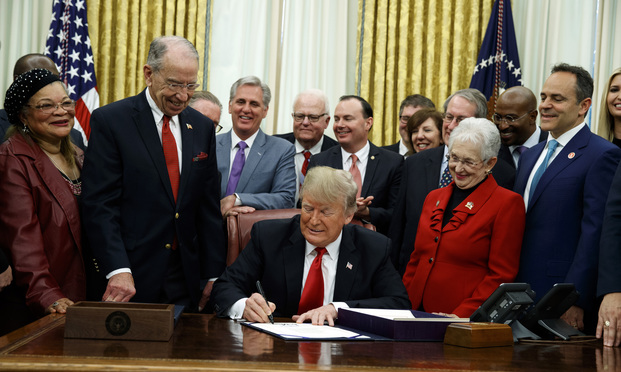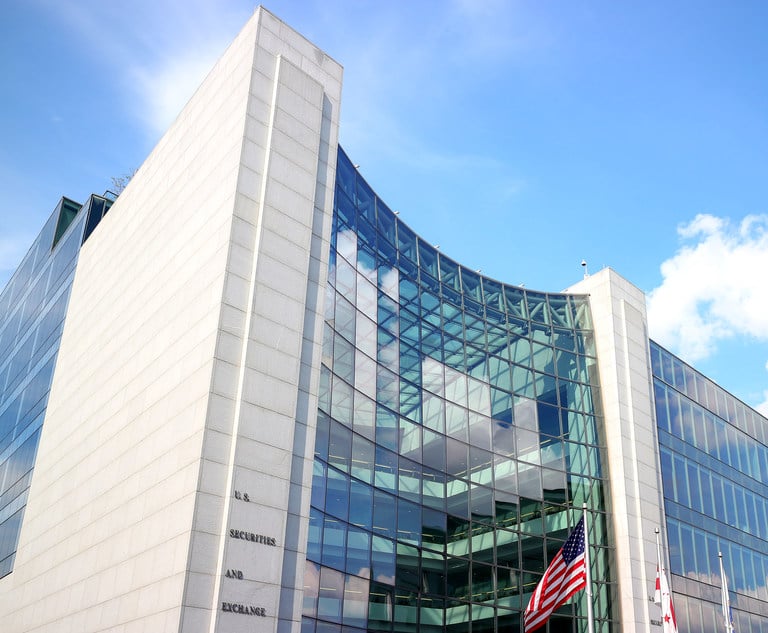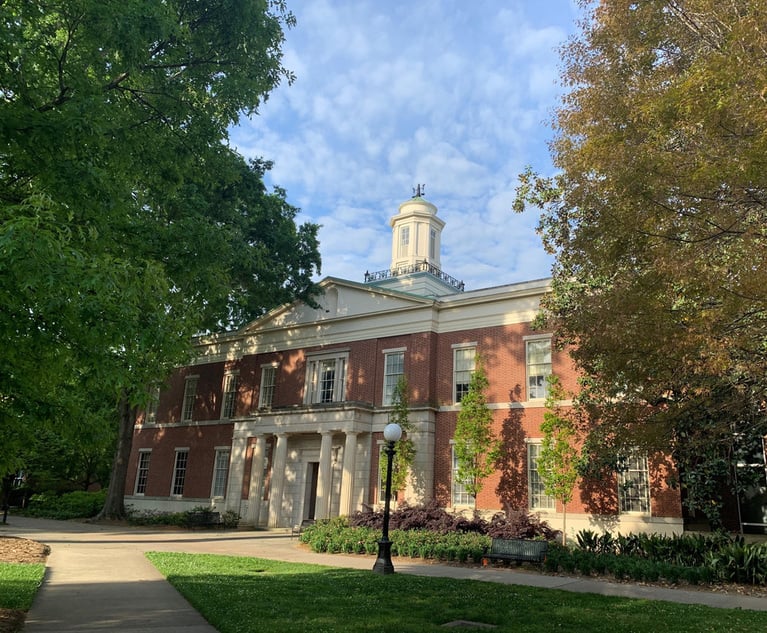Concerned About COVID-19, Advocates Push Policy That Lets Judges Release Ill Federal Prisoners
Groups are trying to spread the word about the "compassionate release" option, in which federal inmates can petition a judge for their release over health concerns.
March 26, 2020 at 04:09 PM
6 minute read
The original version of this story was published on National Law Journal
 President Donald Trump signs criminal justice reform legislation in the Oval Office of the White House on Dec. 21, 2018. (AP Photo/Evan Vucci)
President Donald Trump signs criminal justice reform legislation in the Oval Office of the White House on Dec. 21, 2018. (AP Photo/Evan Vucci)
A provision in the First Step Act could allow judges to release vulnerable federal inmates during the COVID-19 pandemic, a move advocates are pushing for over concerns the virus could easily spread in federal penitentiaries.
Groups have already pointed to federal correctional facilities as having the perfect conditions for an outbreak, noting the unsanitary conditions, strained resources and little space to allow inmates to use best practices such as social distancing.
To try and free older inmates or those with underlying health conditions that could exacerbate the respiratory virus caused by the coronavirus, groups are pushing them to apply for compassionate release, an option expanded by the First Step Act, which President Donald Trump signed in 2018.
Under the provision, inmates with serious illnesses can petition their warden for compassionate release. If the Bureau of Prisons doesn't reply within 30 days, the inmate can then file their motion in federal court, giving judges more power to order the release of inmates who may otherwise suffer or die in jail.
"I would imagine that anyone over 65 years old, or anyone that has a serious, chronic medical condition will be filing, maintaining the risk presented by COVID-19 is so great that the courts should release them," said Shon Hopwood, a professor at Georgetown Law Center and a convicted felon himself.
Inmates and staff at federal correctional facilities are beginning to test positive for COVID-19. But with testing still not widely available nationally, it could prove difficult to determine how many federal prisoners and staff have the virus.
"We need to be looking at at-risk people in jails and prisons, all over the country," said Norman Reimer, the executive director of the National Association of Criminal Defense Lawyers. "These are breeding grounds for disease under normal circumstances. They are potential death traps because they can't do social distancing."
Groups are working together to try and get the word out to inmates about ways they could be released from prison during the pandemic, a task that could prove difficult as many federal correctional facilities are effectively shut down due to the pandemic.
The criminal justice organization Families Against Mandatory Minimums sent a letter to nearly 40,000 federal prisoners earlier this week through its listserv, urging them to take advantage of the option if they think they could be released.
"We think many people in federal prison should have already received compassionate release, but we think the threat of a coronavirus outbreak makes the argument for release even stronger," the letter reads.
Kevin Ring, the president of FAMM, said the group is rushing to recruit and train attorneys who would be willing to provide pro bono representation for inmates applying for release due to the COVID-19 pandemic, and to get the word out to as many incarcerated people as possible.
"We're scrambling, but we felt like we needed to get the message out so the clock could start running," Ring said.
FAMM is teaming up with other groups, including NACDL and the Washington Lawyers' Committee for Civil Rights and Urban Affairs, to help represent any inmates who want to apply for release through the program.
Reimer said he is optimistic that, even as federal courts shut down most proceedings to combat the spread of the coronavirus, that judges will still rule quickly on any applications for compassionate release tied to the pandemic.
"Most judges take their responsibilities, extremely seriously," Reimer said. "I think if they get an emergency application, I would be hopeful that they would rule on it expeditiously. Most of the federal courts are capable of doing things electronically."
The push comes as some leaders have floated releasing inmates who are elderly, sick or nonviolent offenders. Trump said on Sunday that his administration is "looking at" releasing "totally nonviolent prisoners," but has not yet announced any action.
Criminal justice groups urged Trump in a letter Tuesday to commute sentences of vulnerable federal inmates, including those eligible for compassionate release.
A bipartisan group of senators also sent a letter earlier this week to Attorney General William Barr and Federal Bureau of Prisons Director Michael Carvajal urging certain inmates be released or sent to home confinement.
"Conditions of confinement do not afford individuals the opportunity to take proactive steps to protect themselves, and prisons often create the ideal environment for the transmission of contagious disease," the March 23 letter reads. "For these reasons, it is important that consistent with the law and taking into account public safety and health concerns, that the most vulnerable inmates are released or transferred to home confinement, if possible."
Barr on Thursday said he has issued recommendations to BOP officials to consider releasing some at-risk and nonviolent offenders to home confinement, to reduce the prison population during the pandemic.
The coronavirus aid package passed by the Senate on Wednesday night also includes a provision that allows the BOP to extend the amount of time an inmate can be subject to home confinement during the health emergency, with Barr's approval.
In a letter Thursday, Ring urged Barr to use those powers as soon as the legislation is passed by the House and signed into law.
Some advocates are hopeful that judges presented with the motions for compassionate release will view the pandemic as a humanitarian crisis, and rule in favor of the inmates.
But they said action from the executive branch could help incentivize judges to allow more prisoners to be released, at least to home confinement.
"We just have to give every system actor a chance to help. The president could grant clemency. The Bureau of Prisons right now could issue furloughs or approve compassionate release requests faster," Ring said. "Congress could change the rules and give BOP more authority to let these people out, everybody could do something. And it seems to me that the courts need to be part of that.
"My experience is the courts are usually willing to sometimes make the tough calls that the political branches won't," Ring added.
This content has been archived. It is available through our partners, LexisNexis® and Bloomberg Law.
To view this content, please continue to their sites.
Not a Lexis Subscriber?
Subscribe Now
Not a Bloomberg Law Subscriber?
Subscribe Now
NOT FOR REPRINT
© 2025 ALM Global, LLC, All Rights Reserved. Request academic re-use from www.copyright.com. All other uses, submit a request to [email protected]. For more information visit Asset & Logo Licensing.
You Might Like
View All
Librarian's Termination Violated First Amendment Protections, Lawsuit Claims
3 minute read
SEC Sued for Failing to Reveal Records Involving Simpson Thacher Attorney
3 minute read
PayPal Faces New Round of Claims; This Time Alleging Its 'Honey' Browser Extension Cheated Consumers

Trending Stories
- 1Buyer Beware:Continuity of Coverage in Legal Malpractice Insurance
- 2‘Listen, Listen, Listen’: Some Practice Tips From Judges in the Oakland Federal Courthouse
- 3BCLP Joins Saudi Legal Market with Plans to Open Two Offices
- 4White & Case Crosses $4M in PEP, $3B in Revenue in 'Breakthrough Year'
- 5Thursday Newspaper
Who Got The Work
J. Brugh Lower of Gibbons has entered an appearance for industrial equipment supplier Devco Corporation in a pending trademark infringement lawsuit. The suit, accusing the defendant of selling knock-off Graco products, was filed Dec. 18 in New Jersey District Court by Rivkin Radler on behalf of Graco Inc. and Graco Minnesota. The case, assigned to U.S. District Judge Zahid N. Quraishi, is 3:24-cv-11294, Graco Inc. et al v. Devco Corporation.
Who Got The Work
Rebecca Maller-Stein and Kent A. Yalowitz of Arnold & Porter Kaye Scholer have entered their appearances for Hanaco Venture Capital and its executives, Lior Prosor and David Frankel, in a pending securities lawsuit. The action, filed on Dec. 24 in New York Southern District Court by Zell, Aron & Co. on behalf of Goldeneye Advisors, accuses the defendants of negligently and fraudulently managing the plaintiff's $1 million investment. The case, assigned to U.S. District Judge Vernon S. Broderick, is 1:24-cv-09918, Goldeneye Advisors, LLC v. Hanaco Venture Capital, Ltd. et al.
Who Got The Work
Attorneys from A&O Shearman has stepped in as defense counsel for Toronto-Dominion Bank and other defendants in a pending securities class action. The suit, filed Dec. 11 in New York Southern District Court by Bleichmar Fonti & Auld, accuses the defendants of concealing the bank's 'pervasive' deficiencies in regards to its compliance with the Bank Secrecy Act and the quality of its anti-money laundering controls. The case, assigned to U.S. District Judge Arun Subramanian, is 1:24-cv-09445, Gonzalez v. The Toronto-Dominion Bank et al.
Who Got The Work
Crown Castle International, a Pennsylvania company providing shared communications infrastructure, has turned to Luke D. Wolf of Gordon Rees Scully Mansukhani to fend off a pending breach-of-contract lawsuit. The court action, filed Nov. 25 in Michigan Eastern District Court by Hooper Hathaway PC on behalf of The Town Residences LLC, accuses Crown Castle of failing to transfer approximately $30,000 in utility payments from T-Mobile in breach of a roof-top lease and assignment agreement. The case, assigned to U.S. District Judge Susan K. Declercq, is 2:24-cv-13131, The Town Residences LLC v. T-Mobile US, Inc. et al.
Who Got The Work
Wilfred P. Coronato and Daniel M. Schwartz of McCarter & English have stepped in as defense counsel to Electrolux Home Products Inc. in a pending product liability lawsuit. The court action, filed Nov. 26 in New York Eastern District Court by Poulos Lopiccolo PC and Nagel Rice LLP on behalf of David Stern, alleges that the defendant's refrigerators’ drawers and shelving repeatedly break and fall apart within months after purchase. The case, assigned to U.S. District Judge Joan M. Azrack, is 2:24-cv-08204, Stern v. Electrolux Home Products, Inc.
Featured Firms
Law Offices of Gary Martin Hays & Associates, P.C.
(470) 294-1674
Law Offices of Mark E. Salomone
(857) 444-6468
Smith & Hassler
(713) 739-1250








